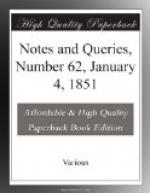Query, Is Vairasse’s residence in England mentioned by any English writer? And can any light be thrown upon the authorship of the History of the Sevarambians from any English source?
L.
* * * * *
ORIGINS OF PRESENT PENNY POSTAGE.
Many of your readers have, I doubt not, perused with interest the vivid sketch of the origin of the Penny Postage System, given by Miss Martineau in her History of England during the Thirty Years’ Peace, vol. ii. p. 425., and have seen in the incident of the shilling letter delivered to the poor cottager, somewhere in the Lake district—refused by her from professed inability to pay the postage—paid for by Mr. Rowland Hill, who happened most opportunely to be passing that way—and, when opened, found to be blank (this plan being preconcerted between the woman and her correspondent, to know of each other’s welfare without the expense of postage). A remarkable instance of “how great events from little causes spring,” and have bestowed much admiration on the penetration of Mr. Hill’s mind, which “wakened up at once to a significance of the fact,” nor ever rested till he had devised and effected his scheme of Post-office Reform; though all the while an uncomfortable feeling might be lurking behind as to the perfect credibility of so interesting a mode of accounting for the initiation of this great social benefit.
I confess to having had some suspicions myself as to the trustworthiness of this story; and a few days since my suspicions were fully confirmed by discovering that the real hero of the tale was not the Post-office Reformer, but the poet Coleridge; unless, indeed, which is surely out of the range of ordinary probabilities, the same event, corresponding exactly as to place and amount of postage, happened to two persons at separate times.
Coleridge relates the story himself, in one of his “conversations,” of which memoranda are preserved in the interesting volumes published by Moxon in 1836 (ii. 114.). “One day,”
“when I had not a shilling to spare, I was passing by a cottage at Keswick where a carter was demanding a shilling for a letter, which the woman of the house appeared unwilling to give, and at last declined to take. I paid the postage, and when the man was out of sight, she told me that the letter was from her son, who took that means of letting her know that he was well. The letter was not to be paid for. It was then opened and found to be blank.”
Now, while so many copies of “NOTES AND QUERIES” pass through the Post-office, it is to be hoped one at least may remain there, and be the means of inducing Mr. Hill to inform us whether Miss Martineau had any authority for fathering this story upon him; and whether the Post-office Reform is really indebted to any such trivial incident for its original idea.




